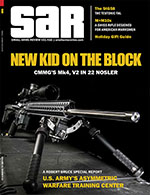NFATCA Report: V21N10
By Jeffrey Folloder
Disaster Strikes: What to Do
Readers should consider this a follow-up to last month’s report, which was written as Hurricane Harvey prepared to make landfall. Harvey did, indeed, make landfall. And Harvey dumped over 50 inches of rain on the Houston metropolitan area, where I live, in just a few short days. Most of you have likely seen pictures and read reports of the devastation that the biblical deluge caused. The water simply had nowhere to go and flooded out many in seemingly random ways. My home averted being flooded out by only one inch. A few doors down, hundreds of neighbors have not been so lucky. The FEMA investigators have labeled most of those homes “uninhabitable,” and 10-foot-high debris and rubbish piles line the curbs. It could have been much worse.
As the tension mounted, I received several communications from the Bureau of Alcohol, Tobacco, Firearms and Explosives (ATF) regarding disaster preparedness. They gave me a few general heads up pointers regarding safeguarding my records and my inventory. Frankly, those communications did not inspire confidence. ATF maintains a public record of all Federal Firearms Licensees (FFLs) and those records are mere clicks away to anyone with an internet connection. The water rose inexorably, and I waited. Eventually, the National Guard and the Sheriff’s office came by and pounded on the door. The evacuation order had been given, and it was time to get out. No can do.
“You don’t understand, sir. This is a mandatory evacuation order and you have to leave now.” And then I went on to explain what an FFL was and that there was no way that I was going to abandon my inventory to potential looters. A few glances were exchanged, and I was told to be safe. Off they went. ATF’s guidance states “If a disaster is imminent, consider relocating inventory.” For the life of me, I could not understand how that is practical. I had about a pallet of bottled water, 45 gallons of gas for the generator, plenty of food and strategically placed defenses, should looters decide to show up. I used some plastic sacks full of potting soil to block the front door. I hunkered down (remind me never to use that term again) and waited with my wife. To busy myself, I got all the inventory that was near floor level up and out of harm’s way.
We watched the 24/7 marathon of storm coverage on satellite TV that never faltered. The power never went out, either. Every hour, on the hour, I poked my head out the front door to see the water rising. First to the curb, then up the front yard and creeping toward my front door. As I wrote earlier, the water got to within an inch and then stopped. And then began to recede. That was when the real work began.
Neighbors began to salvage their belongings. Many of them asked if they could store firearms with me since my home was safe and dry. Being the dutiful FLL, I asked each person that brought guns by to give me written instructions to inspect, clean and repair any water damage for each weapon they presented. I made a copy of their driver’s license and then entered each weapon in my Acquisition and Disposition book. After the weapons were secured, my entire family began helping those same neighbors dismantle their homes. Carpeting and padding had to be cut out and hauled to the curb. Same for soggy sheet rock, water-logged cabinets and furniture, mattresses and appliances. Weeks of work that was just plain nasty.
It was during this demolition that I received a phone call. I could tell from the caller ID that it was one of the Houston area Industry Operations Investigators, and I was immediately on edge. I answered quickly not knowing what was going on. As it turns out, ATF was making personal phone calls to each FFL. ATF wanted to know the status of each of us. Were we safe? Were the premises compromised? Was the inventory secure? Were the records secure? I knew the IOI on the other end of the call. We had previously worked together on an inspection, and I knew that he was a consummate professional. I told him that everything was cool and calm on my end and that I appreciated his phone call to make sure. Frankly, I expected something along the lines of just another automated alert from ATF’s robo-dialer. The personal touch was appreciated.
NFATCA wound up receiving many calls from members wanting to know the right way to take care of things that were scrambled by the hurricane. It happened again when Irma hit Florida. We told our members and others who called that the best way to do things was by the book. Take care of yourself first and then take care of weapons by the book, no shortcuts. Document, document, document every activity. There are still tropical events spinning up near the United States and there could easily be more calamity. It’s never too early to create or hone your disaster plan.
This article first appeared in Small Arms Review V21N10 (December 2017) |
| SUBSCRIBER COMMENT AREA |
Comments have not been generated for this article.



